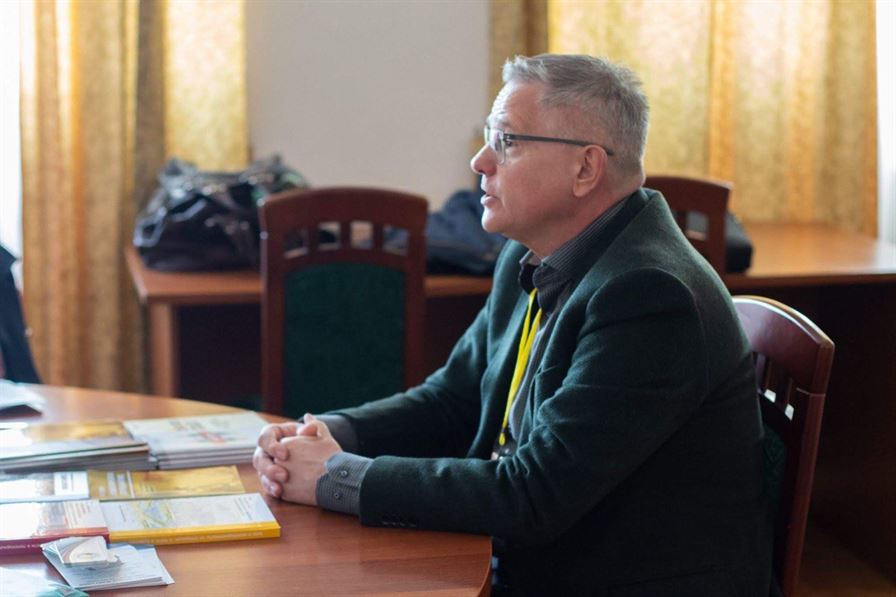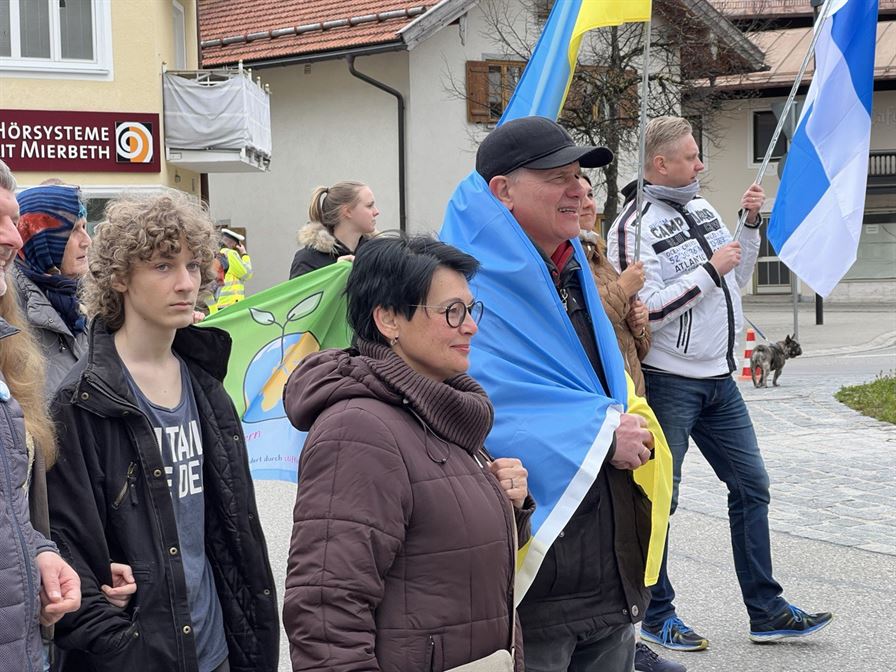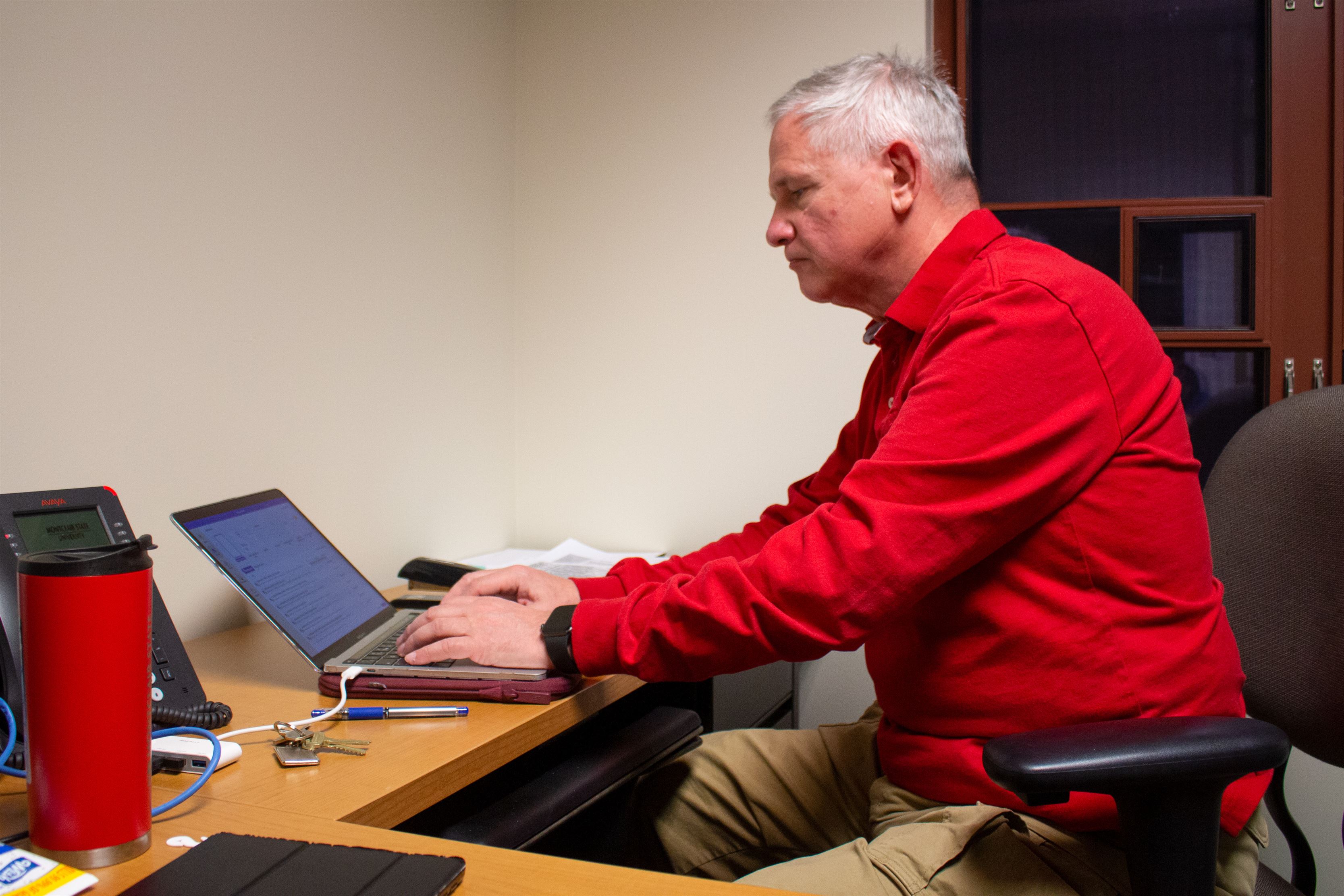To Pavlo Lushyn and countless other Ukrainians, the possibility of a Russian invasion seemed like something out of a dystopian blockbuster movie.
“We somehow were expecting that something bad may happen since December [of] 2021,” Lushyn said. “But nobody believed that. We just thought [the Russians] were frightening us, just so we [would] behave in favor of them.”
But as the whole nation of Ukraine soon realized, that dystopia was to become a reality. On Feb. 24, 2022, Russian troops invaded and turned Lushyn’s life upside down.
Lushyn is a research professor of educational foundations at Montclair State University. In Ukraine, he is the chair of the Department of General and Practical Psychology at the University of Educational Management and a leading scholar in educational psychology.

In Kyiv, Ukraine, Pavlo Lushyn is the head of the department of general and practical psychology at the University of Educational Management.
Photo courtesy of Pavlo Lushyn
Fleeing From Home
But none of his titles mattered when explosions rocked the city of Kyiv, where Lushyn lived and worked at the time.
“We got up very early [on the morning of Feb. 24] because there were blasts somewhere in [the] distance,” Lushyn said. “Explosions [I had] never heard before.”
Lushyn and his wife made their way to a nearby basement-turned-bomb shelter, spending a few frightening days there.
“So we slept there, and every other hour we woke up because the walls were shuddering,” Lushyn said.
At first, Lushyn thought that things would return to normal soon.
“My son [who was in Germany at the time] started to ask me to leave [Kyiv],” Lushyn said. “And I was not ready to do so because I had plans, I had [my] schedule of classes. And [the] next day, I had to go to this university council [meeting] which I am, as a chair, a part of.”
But once Lushyn realized that the Russians could bomb the bridge which led out of Kyiv, he made the decision to leave. Lushyn and his wife first went to Poltava, where his parents were from, and then traveled to Kropyvnytskyi, where he grew up.
After spending a few days traveling, including some nights when Lushyn and his wife had to sleep in their car in freezing temperatures, Lushyn made his way to the border of Moldova, a neighboring country.
“We [waited] in line for about 10 hours,” Lushyn said. “I didn’t sleep much and I [didn’t have the] possibility to sleep at all because the line was moving and if I started [to sleep], I would lose my place in the line.”
After finally crossing the border, Lushyn and his wife spent two days at a friend’s house in Moldova. They then traveled to Romania, where they also spent two days.
Lushyn said that the hospitality of the Moldovians and Romanians is what helped him and his wife get through those challenging days.
“All the Romanians and Moldavians would help us,” Lushyn said. “They would provide some gasoline or money to refuel. And the people were receptive and so hospitable. Sometimes I was just going in my direction and the cars would give me signals and I didn’t know [what they were]. And then I understood that they saw my license plates and it was [Ukrainian] and they would just [say] hello to me.”

Pavlo Lushyn, wrapped in an Ukrainian flag, attends an event in Germany.
Photo courtesy of Pavlo Lushyn
It was at that point when a former student of Lushyn’s offered him a place to stay in Germany, in a town named Hausham near Munich. Lushyn and his wife would spend four months there before they finally could come to the United States.
Coming to the Nest
While in Germany, Lushyn reached out to some contacts he had at Montclair State, beginning a long and complicated process to bring him to the United States.
Maughn Gregory, a professor in the educational foundations department, has known Lushyn since he was a visiting scholar twenty years ago with the Institute for the Advancement of Philosophy for Children. He described the first contact he had with Lushyn about coming to Montclair State.
“[He] just let us know that he and his wife had escaped and immigrated to Germany,” Gregory said. “They were looking for a place to live and to work. He was just asking if we knew of anything. And then, of course, we responded [that] we would love to try to bring him here.”

Pavlo Lushyn working in his office in University Hall.
Sal DiMaggio | The Montclarion
Getting Lushyn to the United States was a job easier said than done. Pablo Tinio, chair of the education foundations department at Montclair State, noted how new and crazy the process was.
“We’ve never done anything like that, so it was really a learning-by-doing and a trial-and-error sort of process,” Tinio said. “There were many challenges: missing paperwork that needed to be found back in Ukraine when bombs were falling, immigration issues given the timeline that was needed to bring [Lushyn] here and many more.”
Meanwhile, back in Germany, all Lushyn could do was wait.
“Europe was overcrowded with Ukrainians,” Lushyn said. “[They were] everywhere. And the line at [the] American embassy in Germany was three months [long].”
Because of the number of refugees, it seemed like Lushyn wouldn’t have been able to come to the United States until Oct. 2022. But one August morning, on a whim, he decided to go to the embassy to see if anything could be done.
“There was [something one] morning, I just said to my son, ‘Maybe there’s something changing. Maybe people would do something and maybe the line will be not that long,’” Lushyn said.
That’s when a “miracle” happened: on that day, there was a spot for a visa open. Lushyn was coming to the United States.
A New Home
It’s been six months since Lusyhn moved into an on-campus apartment in Hawks Crossings with his wife, and something that he still hasn’t gotten used to is the amount of attention he has gotten.
“I’m just like a celebrity,” Lushyn said, smiling a little bit. “People [will] always come up to me and say, ‘How are you? Maybe you need some help.’ And [then there are] the interviews and TV sessions, which I [haven’t] very much [gotten] used to, but that’s my only way [of just saying] thank you to all those people who are doing great [things] for me and my family.”

Pavlo Lushyn came to Montclair State in August 2022 after fleeing from Ukraine with his wife and spending four months in Germany.
Lynise Olivacce | The Montclarion
Having been a professor for a little over a semester now, Lushyn spoke about his experience teaching at Montclair State.
“The students are the same, although the facilities are absolutely fantastic,” Lushyn said. “They have computers, they have the labs— well, they have everything which they need. The technology is way better than in Ukraine.”
Despite the differences in technology, there was one thing Lushyn found that Ukrainian and American students have in common: slang.
“Sometimes it’s way more difficult to get what they mean, but, well, we get along quite okay,” Lushyn said.
Others have noted how Lushyn has flourished while at Montclair State. Gregory talked about what Lushyn brings to the educational foundations department.
“His scholarly outlook is pretty unique,” Gregory said. “Through the years he has developed a particular outlook on educational psychology and the psychological dynamics of what happens in classrooms with different kinds of pedagogy, which is tremendously important for us.”
Tinio also described what he has seen from Lushyn during his time at Montclair State.
“He’s constantly trying to learn new things, experimenting with different ways of engaging his students and volunteering his time to help people back in his home country, like spouses and children of soldiers,” Tinio said. “He’s a trained therapist, so he’s in a place now where he can put that expertise to use, to help his people, who are facing life and death situations.”
War’s Mental Toll
While in Germany and even now in the United States, Lushyn continues to meet online with Ukrainian students. His job isn’t about teaching out of textbooks and lecturing about theories anymore, however. It’s about making sure that the students are mentally sound in such chaotic times.
“We are just working and restoring their health conditions, and coming up with new ideas [on] how to build [the] future: not only [the student’s] individual future, but the common future,” Lushyn said.
In addition to holding group therapy sessions in his role as a leading Ukrainian psychology scholar, Lushyn also participates in international discussion groups to guide students through tough times. This way, students don’t lose sight of their educational and professional goals.
“The president of [the University of Educational Management] came up to me and said, ‘Do we have an idea [of] how to hold this together so that the students didn’t leave for good?’” Lushyn said. “I said, ‘The only thing is just to forget about the curriculum.’ [The goal is to] provide [the students with] everything that will be helpful [here and now] just to survive [and] to have a future.”
For Lusyhn, this was the simplest way that he could give back.
“I’m just doing what I can do,” Lushyn said. “And not many professors living abroad now can work so much like I’m doing it, and it’s owing to the fact that I am safe here.”
The war didn’t just have a mental impact on his students, though. Lushyn also had to deal with the trauma of the war in his own way.
“I have a lot of cases when people are in the most dramatic situation in their lives, and then they started to grow, not just to overcome the negative adversity [of] all these things, but to grow from it,” Lushyn said. “And it looks like something which I [taught for] 30 or 40 years [is] happening to me now.”
Lushyn used a certain type of argumentative philosophy called Hegel’s dialectic to accept all that has happened to him over the past year. In this mindset, there is a thesis and its opposite, the antithesis. There then comes a stage of contradiction between these two, which is eventually resolved in what is known as the synthesis.
Lushyn used this philosophy when it came to his thoughts on the war in Ukraine.
“So I’m not quite sure in which stage I’m now,” Lushyn said. “But even [in] the course of [the] war, [there was a time when it] was absolutely negative, and now Ukraine is moving into [an] absolutely positive scenario.”
A Look Ahead
In terms of what’s next for Lushyn, he isn’t quite sure.
“I’m not much into ‘[the] future’ now because I’m not very young,” Lushyn said. “That’s one thing. I’m doing what I can do, and I never expected that I [would] be doing it [at] my age so much because [at] my age, I [could] retire.”
But retiring now for Lushyn wouldn’t make any sense, not in the United States.
“It looks like I’m not going to [retire], because [being] retired when I’m very productive [is not what I’d] love to [do],” Lushyn said.
Returning to Hegel’s dialectic, coming to Montclair State was the positive antithesis to the negative thesis of the war for Lushyn.
Lushyn expressed his desire to return to Ukraine, but he doesn’t know what life would hold for him there.
“Even [if] the war is over tomorrow, for instance, I will [need] more years to restore all [my] things because they ruined everything,” Lushyn said. “I would love to go there, but I’m not quite sure if I’ll be able to have a position at the [University of Educational Management], because that’s hard to say.”
But whatever the case may be, Lushyn plans on devoting himself to his life’s work and giving back as much as he can.
“I’m a lucky guy who first survived and [now is] happy to be working and doing the most interesting work in my life,” Lushyn said.



